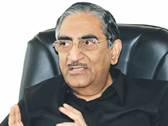By Ashraf Mumtaz (Interview published in daily “The Nation” on May 28, 2013).
 Pakistan had taken the decision to carry out nuclear tests at a meeting of the Defence Committee of the Cabinet, held two weeks before the devices were actually exploded in Chagai, Balochistan, on May 28, 1998, a senior scientist who played lead role in making Pakistan a nuclear state said on Monday.
Pakistan had taken the decision to carry out nuclear tests at a meeting of the Defence Committee of the Cabinet, held two weeks before the devices were actually exploded in Chagai, Balochistan, on May 28, 1998, a senior scientist who played lead role in making Pakistan a nuclear state said on Monday.
Dr Samar Mubarakmand told The Nation on the eve of the 15th anniversary of the nuclear tests that at the May 14th DCC meeting all relevant people were present and they expressed their views on whether Pakistan should respond to the five tests carried out by India three days ago.
The meeting was presided over by then Prime Minister Nawaz Sharif while Dr AQ Khan, the foreign minister, the services chiefs and Dr Mubarakmand were among the attendees.
Mr Sharif patiently listened to the views expressed by all participants. Most of them said the situation demanded that Pakistan should display its nuclear capability without any delay. When the majority opinion came in support of the tests, the prime minister also added his voice to the same view.
“On this,” Dr Mubarakmand recalled, “I asked the prime minister whether I should go to the field to carry out the explosions.”
“Not yet,” replied Mr Sharif.
The nuclear scientist said the prime minister told the meeting that before testing the nuclear devices Pakistan would take all its friendly countries into confidence. For this purpose, he said, special delegations would be sent to various states and on their return home the go-ahead would be given.
The green light was given on May 20 and the teams of scientists and engineered took the process to its logical conclusion in nine days by carrying out tests.
Five tests were carried out on May 28, as a result of which Pakistan came on a par with India. Another nuclear device was exploded on May 30.
As a result, Pakistan got ahead of India in this field.
A day before the DCC meeting, Mr Sharif had separately called Dr Mubarakmand to ask what would happen if the tests failed. “In that case Pakistan would have to face a very serious embarrassment,” Mr Sharif said answering his own question.
At this juncture, Dr Mubarakmand told the prime minister: “We’ll make 150 per cent efforts to make the tests a success. However, the result is in the hands of Allah.”
He further said that everybody should pray for the success of the mission.
Replying to a question about what had actually happened on May 28, 1998, the nuclear scientist said it was a very important day of his life. On this day, he said, when he asked the relevant engineer to press the computer button to carry out the explosion, everybody present on the site wanted to see something practically exploding. The time was 3.15pm and when nothing happened for five seconds, everyone was worried. “These five seconds were the longest period of my life.”
However, when the explosion took place after five seconds, everybody was very happy and was raising slogan: “Allah-o-Akbar”.
Dr Mubarakmand fell prostrate to thank Allah for this great achievement.
Answering a question, the nuclear scientist said after Pakistan became a nuclear power, three wars with India were averted only because New Delhi knew that Islamabad was in a position to come up with a matching response.
He said after the 1999 Kargil episode, there was a possibility of a war between the two nuclear neighbours. But India did not dare go ahead because of Pakistan’s nuclear capability.
Then again a tense situation came to be seen in 2002 when India deployed troops on its border with Pakistan. The standoff continued for several months, but the war was averted.
In 2008, the relations between the two countries got strained after the Mumbai attacks. However, the situation did not lead to a war – again because of the nuclear capability of Pakistan.
After the nuclear tests, Dr Mubarakmand said Pakistan also developed a delivery system for the nuclear weapons.
He said Pakistan became a nuclear power because of the collective efforts of a large number of scientists and engineers.